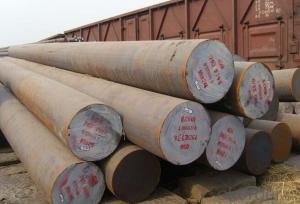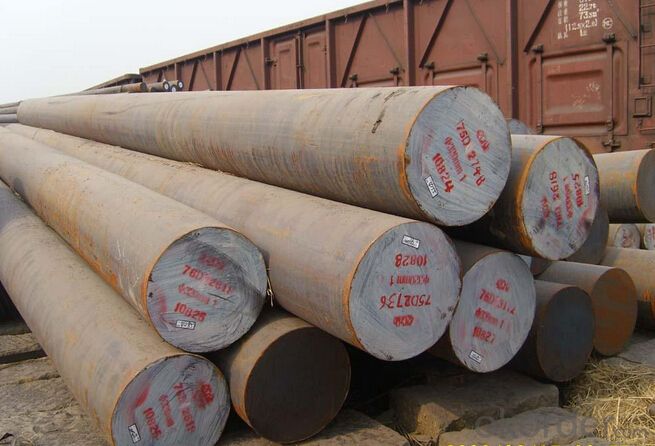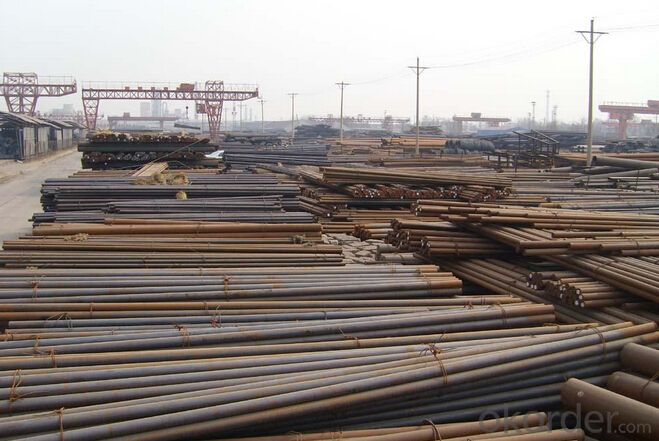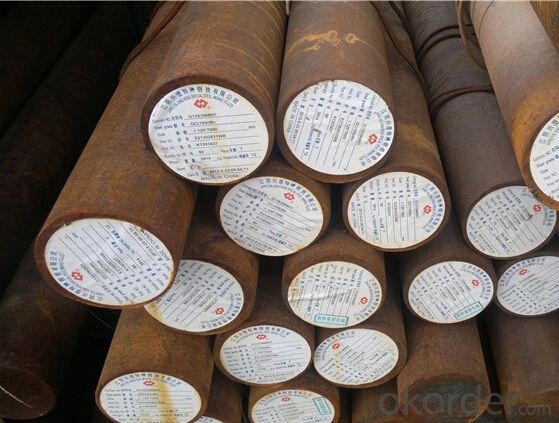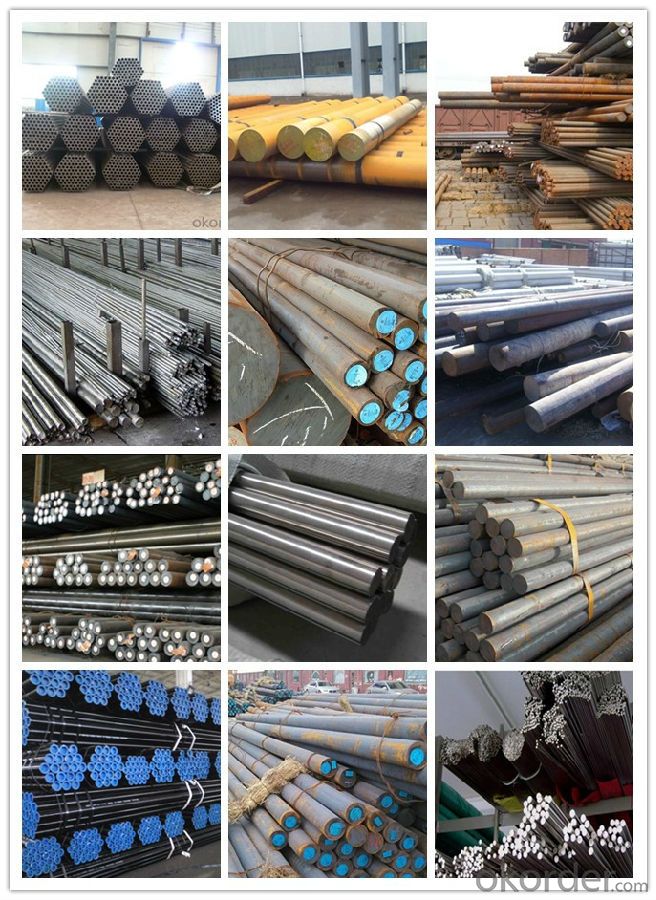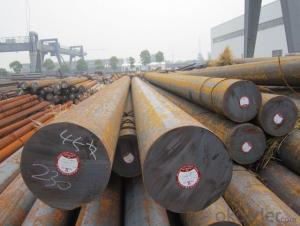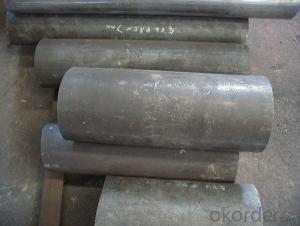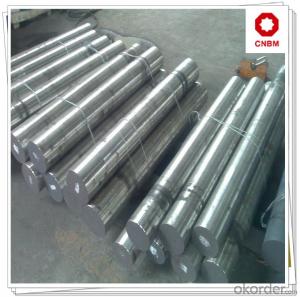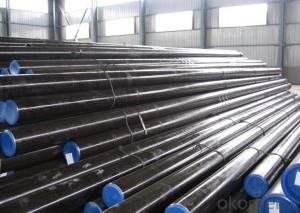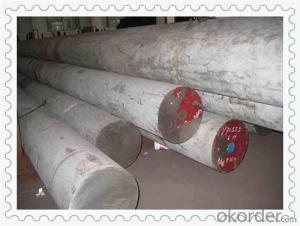Special Steel SAE1010 Carbon Steel Round Bars
- Loading Port:
- China main port
- Payment Terms:
- TT OR LC
- Min Order Qty:
- 30 m.t.
- Supply Capability:
- 10000 m.t./month
OKorder Service Pledge
OKorder Financial Service
You Might Also Like
Specification
Specification :
| Size | round | Dia 16mm~350mm |
| Standard | GB/T699-1999 | |
| Surface Condition | Black surface | |
| Delivery Condition | hot rolled | |
| Payment Terms | T/T;L/C | |
| Trade Terms | FOB;CIF | |
Product List :
| GB | ASTM | JIS | EN | DIN |
| 10# | 1010 | S10C | C10C | 1.0214 |
| 15 # | 1015 | S15C | C15C | 1.0234 |
| 20 # | 1020 | S20C | C22 | 1.0411 |
| 25 # | 1025 | S25C | C25 | 1.0406 |
| 30 # | 1030 | S30C | C30 | 1.0528 |
| 35 # | 1035 | S35C | C35 | 1.0501 |
| 40 # | 1040 | S40C | C40 | 1.0511 |
| 45 # | 1045 | S45C | C45 | 1.0503 |
| 50 # | 1050 | S50C | C50 | 1.054 |
| 55 # | 1055 | S55C | C55 | 1.0535 |
| 60 # | 1060 | S58C | C60 | 1.0601 |
| 65 # | 1065 | SWRH67B | C66D | 1.0612 |
| 70 # | 1070 | SWRH72A | C70D | 1.0615 |
| 75 # | 1075 | SWRH77A | C76D | 1.0614 |
| 80 # | 1080 | SWRH82A | C80D | 1.0622 |
| 85 # | 1084 | SWRH82A | C86D | 1.0616 |
Product show
Workshop show
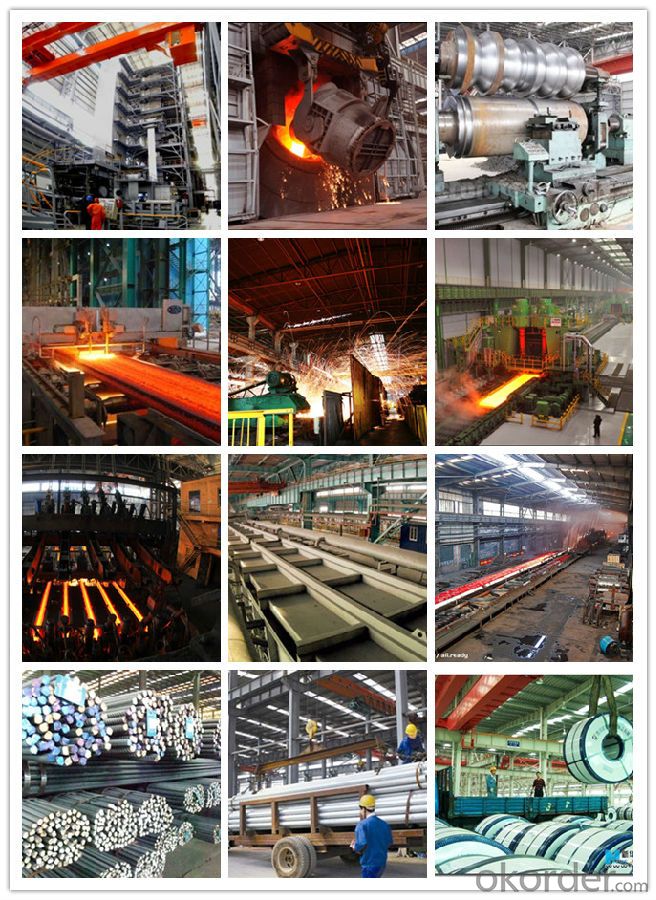
Shipping
1. FedEx/DHL/UPS/TNT for samples, Door-to-Door;
2. By Air or by Sea for batch goods, for FCL; Airport/ Port receiving;
3. Customers specifying freight forwarders or negotiable shipping methods!
Delivery Time: 3-7 days for samples; 5-25 days for batch goods.
Payment Terms
1.Payment: T/T, L/C, Western Union, MoneyGram,PayPal; 30% deposits; 70% balance before delivery.
2.MOQ: 1pcs
3.Warranty : 3 years
4.Package Informations: 1) EXPORT, In 20 feet (GW 25 ton) or 40 feet Container (GW 25 ton)
2)as customer's requirement
Why choose us?
(1) The leading exporter in China special steel industry.
(2) Large stocks for various sizes, fast delivery date.
(3) Good business relationship with China famous factories.
(4) More than 7 years steel exporting experience.
(5) Good after-sales service guarantee.
- Q: Can special steel be used in the telecommunications industry?
- Yes, special steel can be used in the telecommunications industry. Special steel, such as stainless steel or high-strength steel, is often used for the construction of telecommunication towers, antennas, and other infrastructure due to its strength, durability, and corrosion resistance. It helps ensure the stability and reliability of telecommunications equipment, particularly in harsh weather conditions or areas prone to corrosion.
- Q: What are the common quality control measures for special steel?
- Some common quality control measures for special steel include performing chemical composition analysis, conducting mechanical property testing, inspecting surface defects, ensuring dimensional accuracy, and conducting non-destructive testing such as ultrasonic or magnetic particle inspection. Additionally, the use of standardized quality control systems, such as ISO 9001, can aid in ensuring consistent and reliable production of special steel.
- Q: What are the different methods for improving the fatigue strength of special steel?
- There are several methods for improving the fatigue strength of special steel. 1. Heat treatment: One of the most common methods is through heat treatment processes such as annealing, quenching, and tempering. These processes help to refine the microstructure of the steel, reducing the presence of impurities, and improving its fatigue resistance. 2. Surface treatment: Surface treatments like shot peening and nitriding can enhance the fatigue strength of special steel. Shot peening involves bombarding the surface of the steel with tiny metal particles, inducing compression stress in the material, which helps to prevent crack initiation and propagation. Nitriding involves diffusing nitrogen into the surface layer of the steel, forming a hard and wear-resistant nitride layer that enhances the fatigue resistance. 3. Alloying: Alloying special steel with certain elements can significantly improve its fatigue strength. For example, adding chromium, molybdenum, or vanadium can enhance the steel's hardenability and resistance to fatigue. These alloying elements form carbides or nitrides, which act as barriers to crack propagation. 4. Surface coatings: Applying protective coatings like electroplating, hot-dip galvanizing, or physical vapor deposition (PVD) can help improve the fatigue strength. These coatings provide a barrier against environmental factors that may lead to corrosion or surface damage, ultimately enhancing the fatigue life of the steel. 5. Grain refinement: By refining the grain size of the steel through processes like severe plastic deformation or equal channel angular pressing (ECAP), the fatigue strength can be improved. Fine-grained steels have a higher resistance to crack initiation and propagation, resulting in enhanced fatigue properties. 6. Residual stress management: Controlling and managing residual stresses in the steel can improve its fatigue strength. Techniques like stress relieving or shot peening can help to reduce tensile residual stresses, which are detrimental to fatigue resistance. It is important to note that the selection of the most appropriate method for improving fatigue strength depends on the specific requirements, the type of special steel, and the intended application of the material.
- Q: What are the main advantages of using special steel in the mining industry?
- The main advantages of using special steel in the mining industry are its exceptional strength, durability, and resistance to wear and tear. Special steel can withstand the harsh conditions and extreme forces encountered in mining operations, ensuring the longevity of equipment and machinery. Additionally, its high resistance to corrosion and heat makes it ideal for mining processes involving chemicals and high temperatures. Overall, the use of special steel enhances the efficiency, safety, and productivity of mining operations.
- Q: How does special steel ensure dimensional stability?
- Special steel ensures dimensional stability through a combination of factors such as controlled composition, precise heat treatment, and careful manufacturing processes. The specific composition of special steel is designed to have a lower coefficient of thermal expansion, which means it expands and contracts less with changes in temperature compared to regular steel. This ensures that the dimensions of the steel remain stable even under varying temperature conditions. Additionally, the heat treatment process further enhances the dimensional stability by refining the microstructure and reducing internal stresses. The careful manufacturing processes, including precise machining and quality control, also contribute to maintaining dimensional stability in special steel products.
- Q: What are the advantages of using special steel in construction?
- There are several advantages of using special steel in construction. Firstly, special steel offers exceptional strength and durability, making it suitable for high-rise buildings, bridges, and other structures that require long-term stability. Additionally, special steel is resistant to corrosion, which enhances its lifespan and reduces maintenance costs. Furthermore, special steel can be fabricated into various shapes and sizes, allowing for flexible and efficient construction designs. Lastly, due to its recyclability, special steel is an environmentally friendly choice that promotes sustainability in the construction industry.
- Q: How is high-speed tool steel used in the production of machining tools?
- High-speed tool steel is used in the production of machining tools due to its exceptional hardness, strength, and heat resistance properties. It is commonly used to make cutting tools such as drills, end mills, taps, and inserts, which are vital for precision machining operations. The high-speed tool steel's ability to retain its hardness even at high temperatures allows these tools to withstand the intense heat generated during the machining process, resulting in improved performance and extended tool life.
- Q: How does special steel contribute to the manufacturing of power generation equipment?
- Special steel plays a crucial role in the manufacturing of power generation equipment by providing exceptional strength, durability, and resistance to extreme conditions. It is used in turbine blades, rotors, and other critical components, allowing for higher efficiency and performance. Additionally, special steel's ability to withstand high temperatures and corrosive environments ensures the longevity and reliability of power generation equipment, ultimately contributing to the overall efficiency and effectiveness of power generation processes.
- Q: Can special steel be used in tool manufacturing?
- Yes, special steel can be used in tool manufacturing. Special steel refers to a category of steel that has specific properties and characteristics that make it suitable for various applications, including tool manufacturing. Special steel is often alloyed with other elements such as chromium, molybdenum, or vanadium to enhance its strength, hardness, and wear resistance. In tool manufacturing, special steel is commonly used for making cutting tools, drills, dies, molds, and other tooling components. Its high strength and hardness allow it to withstand the demanding conditions of cutting, drilling, and shaping various materials. Special steel also offers excellent resistance to wear, heat, and corrosion, making it ideal for tools that need to maintain their sharpness and performance over prolonged use. Moreover, special steel can be further processed and treated through heat treatment techniques such as quenching and tempering to achieve specific hardness levels and improve its overall performance. This versatility makes special steel a preferred choice for tool manufacturers who prioritize durability, precision, and longevity in their products. Overall, special steel has proven to be a reliable and efficient material in tool manufacturing, enabling the production of high-quality tools that meet the needs of various industries, from automotive and aerospace to construction and manufacturing.
- Q: How is special steel used in the production of springs?
- Special steel is used in the production of springs due to its excellent mechanical properties. It provides the necessary strength, durability, and elasticity required for springs to function effectively. The unique composition and heat treatment of special steel enable springs to withstand high levels of stress and repetitive loading, ensuring their longevity and reliability in various applications such as automotive, aerospace, and machinery industries.
Send your message to us
Special Steel SAE1010 Carbon Steel Round Bars
- Loading Port:
- China main port
- Payment Terms:
- TT OR LC
- Min Order Qty:
- 30 m.t.
- Supply Capability:
- 10000 m.t./month
OKorder Service Pledge
OKorder Financial Service
Similar products
Hot products
Hot Searches
Related keywords
